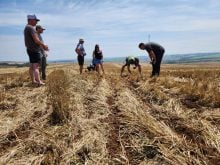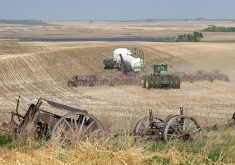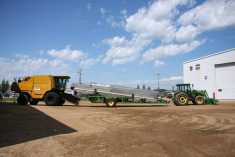The recession has been tough on the alpaca business.
Rita Friesen, who raises alpacas near Saskatoon with her husband, Cam, on their CaRia Royalty Ranch, said profits are down from previous years because fewer people are buying their breeding stock and fibre products.
Producer Deryl Ring of Ring Ranch Alpacas near Saskatoon agreed, but thinks Canadian alpaca farmers have had an easier time than those in the United States.
“I think it’s slowed down with the rest of the economy, especially down in the States,” he said. “We haven’t felt it as much as they have down there.”
Read Also

Geopolitics can change trade routes
WHISTLER, B.C. — Today’s geopolitical tensions could have dire long-term consequences, says the director of international policy at the University…
David Wood of Woody Acres Alpacas near Saskatoon said the downturn wasn’t a surprise because the business has ups and downs like any other industry.
However, he said a consistently positive market isn’t the reason he is in the business. He bought his ranch because he enjoys alpacas.
“Initially, when I got the alpacas, friends and family would come out and say, ‘well, I guess you’ll have to get some pigs and cows and chickens and all that.’ Nope … that’s all I’m interested in, is alpacas.”
Friesen, Ring and Wood were among the alpaca producers who recently participated in the industry’s first Canadian Alpaca Farm Days.
The event, which was held across the country on the last weekend in September, was designed to introduce the public to alpaca farming.
The ranchers said they were happy to be involved because they believe in their industry.
“It’s a nice, slow-growing alternative livestock that many people are going towards,” said Ring, who decided to raise alpacas because he liked their appearance and fibre.
Love their alpacas
Wood said he felt the same way when he bought his alpaca ranch eight years ago.
“I guess that was one of the main reasons that attracted me to them – it’s a renewable resource,” he said. “I like reusing and not killing and destroying.”
Alpaca fibre is sheared from the animals once a year and then sent to processing plants where it is spun into yarn.
Ranchers decide if they want to sell the yarn themselves or through a third party.
How this yarn can be used depends largely on the alpaca breed. Suri fibre is a long, ringlet-style fibre that is generally used for woven fabrics.
Huacayas grow a shorter fibre with more crimp, resulting in a good-quality knitting yarn that can be made into hats, socks, sweaters, blankets and rugs.
The Friesens sell their own products, some of which is made by an outside company. However, the family also sells yarn to customers as well as knitting it themselves.
Rita said there are a lot of benefits to alpaca fibre, including its softness, warmth and lack of lanolin, which makes it a hypoallergenic material. It’s less itchy than wool, creating an alternative for those wishing to stick to natural fibres.














